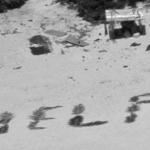On many movie DVD’s, there is an option to watch the film with a running commentary from the director and the actors. It usually gets pretty obnoxious to listen to. I’m probably just not hipster enough. I often feel like we’re watching the “with commentary” version of the film whenever we read the story of Eden in Genesis 2-3, because the actual words of the text are usually drowned out by the background noise of the Reformers reading Augustine reading Paul reading Genesis. For Eden’s modern evangelical commentators, the focus is entirely upon Adam and Eve’s disobedience of God. Every other detail is mostly superfluous. When I read the story, however, I see the accent falling in a very different place, because Adam and Eve “die” when their eyes are opened to their nakedness (Genesis 3:7).
There are reasons to interpret the Garden of Eden story canonically, that is in balance with what the rest of the Bible says about sin and about Adam and Eve, but it’s important to know at least what’s in the story when we turn off the commentary of the Reformation and read it at face-value. Here are several troubling observations we must confront.
I. God doesn’t completely tell the truth
In Genesis 2:16-17, God says to Adam, “You may freely eat of every tree of the garden, but of the tree of the knowledge of good and evil you shall not eat, for on the day that you eat of it you shall die.” There are two significant things about how this instruction is given.
First, Adam and Eve do not die in a physical sense “on the day” that they eat the fruit. If we are to operate under the assumption that God doesn’t lie, then whatever God calls “death” in Genesis 2:17 must be something that happens “on the day” the fruit is consumed and not as a future punishment (which is the mainstream interpretation).
Secondly, because God’s instruction has been given with a justifying explanation, it can be interpreted as a warning rather than a command. God could have said, “Don’t eat from this tree because I say so and I’m God.” Because God framed His instruction to Adam in this way, then Adam and Eve’s response is more the failure to heed a warning than the disobedience of a command.
II. The serpent seems to tell the truth
The serpent tells Eve two things in Genesis 3:4-5: “You will not die, for God knows that when you eat of it your eyes will be opened, and you will be like God, knowing good and evil.” The first part of what the serpent says is corroborated by the fact that Adam and Eve don’t die after eating the fruit. The second part is corroborated in the justification God gives for throwing Adam and Eve out of the garden: “See, the man has become like one of us, knowing good and evil; and now, he might reach out his hand and take also from the tree of life, and eat, and live forever” (Genesis 3:22).
III. God seems threatened by humanity’s power
Genesis 3:22 is perhaps the most embarrassing verse in the whole Bible. God doesn’t kick Adam and Eve out of the garden as punishment for disobedience; He kicks them out because they might eat from the tree of life and live forever. That is the justification given in the plain meaning of the text. Some people come up with some very creative ways of making God’s motives noble like saying that He didn’t want them to be immortally cursed, but that’s ultimately speculation that isn’t derived in the text. I happen to think this particular verse was probably a wrinkle in the story left over from whatever ancient polytheistic myth it’s derived from (the Hebrew writers knew nothing of the Trinity).
It’s fine to make God’s motives benevolent and make his “us” into the Father, Son, and Holy Spirit retroactively as long as we admit that that’s what we’re doing. We’re robbed of the Hebrew irony in the original story if we try to airbrush this part out of the text. The irony is that the serpent technically told the truth while God was less than fully truthful because they didn’t die and God did want to stop Adam and Eve from becoming like Him, but… the serpent’s truth was a deceitful kind of truth. The knowledge of good and evil gave Adam and Eve a “godlike” characteristic that they couldn’t handle. So things aren’t really what they seem, but we need to be honest about what seems true from the text in order to appreciate this irony.
IV. Adam and Eve “die” when their eyes are opened
“Then the eyes of both were opened, and they knew that they were naked” (Genesis 3:7). This is the decisive moment of the story. Both God and the serpent have spoken truthfully about the same event. The serpent said, “Your eyes will be opened.” God said, “You will die.” The only knowledge that Adam and Eve possess that they didn’t have before eating the fruit is a self-awareness that creates shame and fear. Gaining this knowledge kills the existence that they had before it and curses human existence thereafter.
Adam’s explanation to God for why he hid in the bushes is important: “I was afraid, because I was naked” (Genesis 3:10). This nakedness is not superfluous. God told Adam and Eve not to eat the fruit because they would die. It is steamrolling over a critical distinction in the text to describe Adam and Eve’s fall as mere disobedience; their disobedience resulted in consequences that God wanted them to avoid and articulated for them in the simple terms of the word “death.”
Look at the consequences God gives to Adam and Eve. Both have to do with self-awareness. For Eve, he says, “I will greatly increase your pangs in childbearing; in pain you shall bring forth children, yet your desire shall be for your husband, and he shall rule over you” (Genesis 3:16). God could not “increase” her pangs in childbearing if there were no procreation before this moment in time (as many virginity-obsessed church fathers presumed). The Hebrew verb here is ravah which means “multiply.” This leaves us with the choice that Eve either would have had or already had children without as much pain if she had not experienced the “death” of her innocent lack of self-awareness.
Can animals be said to suffer pain in childbirth? Certainly they have nerves throughout their body no differently than humans die, but the key difference is their level of consciousness. Certainly they have some semblance of memory, but they aren’t able to willfully bring their memories back into their minds the way that humans can. Childbirth happens and then it’s done. For humans, it is a pain that can be remembered and thus dreaded in anticipation the second time it happens. Because our eyes have been opened to our nakedness.
Regarding Adam’s punishment, God says, “Cursed is the ground for your sake; in sorrow shall you eat of it all the days of your life; thorns also and thistles shall it bring forth to you; and you shall eat the herb of the field; in the sweat of your face shall you eat bread, till you return to the ground; for dust you are, and to dust you shall return” (Genesis 3:17-19). In other words, Adam will no longer be able to live as a hunter-gatherer wandering through the forest without a care, picking fruits and eating them when he feels the urge. He will have to take up farming and manipulate nature to his advantage.
Now one way of interpreting what God says here is that the earth suddenly became a wasteland in the instant of God’s pronouncement of this curse on Adam. Or that this curse describes God’s eviction of Adam and Eve from Eden. But Genesis 3:22 shoots down this interpretation if we’re exegetically faithful to the text. It is not just a pronouncement of Adam and Eve’s eviction from the garden, but God’s deliberation about the threat they pose that subsequently leads to His decision to evict them.
Thus, I don’t think it’s unreasonable to say that the Garden of Eden turns into a plantation of scarcity because of the way Adam’s eyes have been opened to his nakedness and mortality. Instead of lackadaisically walking through the forest to grab fruit and eat when he’s hungry, a self-aware Adam worries whether the fruit will run out and thus must plant crops in order to have control over the future. If Adam and Eve would have had to eat the fruit of the tree of life to become immortal (Gen 3:22), then they weren’t immortal before their fall. When God says, “Dust you are, and to dust you shall return,” this is not God changing Adam’s mortal fate but rather throwing it in his face.
Animals in their natural condition (as opposed to domesticated animals) are immortal because they are not individually differentiated. Some die; some are born; and the herd lives on. It is with individual self-awareness that mortality gains its true meaning. Instead of living like the “birds of the air [who] neither sow nor reap nor gather into barns” (Matthew 6:26), Adam must contend with the dread of the dust that he will become and spend all the days of his life fighting thistles and thorns by the sweat of his brow in the desperate, ultimately futile quest to postpone the day of his death.
But Adam and Eve could have remained like the “birds of the air” or “lilies of the field” that Jesus talks about: procreation without the dread or memory of pain, companionship without the gendered power struggle that gives man dominion over woman because she can be impregnated, and sustenance without the anxiety that one day the trees might not have any more fruit. Because their eyes were opened to their nakedness, they died from the life of innocent dependence upon God and entered into the frightful, defensive existence of self-preservation.
V. Implications for Original Sin
Perhaps there are places in which my interpretation was not strictly exegetical. But I think it is a plausible reading of the text and moreover a reading which does not conflict with the references to Adam and Eve made in Romans 5 or 1 Corinthians 15 by Paul (who as far as I know is the only New Testament author who talks about Adam and Eve at all). The death instilled by Adam’s trespass is a very real death that causes our default state of existence. You can call it punitive, since God does say to Eve, “I will increase your pain” (although the Hebrew is very strange here – ravah is repeated twice with a hey and aleph prefix, the aleph indicating first person qal singular, the hey indicating third person hiphil singular). If the curse is punitive, that doesn’t preclude it being a consequence of the self-awareness that the fruit creates.
Since I interpret the story as an allegory, I see it representing two decisive moments simultaneously: 1) the primordial historical “moment” at which hominids became sapient humans who were self-aware enough to hoard resources and engage in planned, not solely instinct-triggered conflicts with each other to this end; 2) the point in our childhood development when our eyes are opened to our nakedness and we start to worry about defending ourselves and justifying our actions to other people.
I realize some readers might be offended by my interpretation because it doesn’t sound “moral” enough. I just don’t see Genesis 3, or Paul for that matter, to be as invested as post-Augustinian theologians in making Adam and Eve’s fateful choice into the greatest crime of human history. What Adam and Eve’s choice represents allegorically is the foundation for all sin, not because of some infinite culpability on their parts, but because all sin has its origins in self-awareness.
This may sound too benign, but the deceptive benignity of sin is actually a critical recognition to make about it. We all think we’re being reasonable when we choose the lesser good of self-gratification that is more immediately present to our consciousness over a greater good of justice and harmony in our community that seems abstract from our field of vision. The more self-focused we become, the more benign we feel engaging in truly evil deeds.
In any case, every single one of us needs deliverance from the self-worship that we inherently fall into. We are all caught in a plight that we didn’t choose for ourselves; it chose us before we were mature enough to make our own decisions. The fact that we can blame our ancestors for the existence we inherited is why we call it original sin, but our lack of original responsibility doesn’t nullify our need to be delivered. Pointing out that “we didn’t start the fire” doesn’t change anything about our condition and need.
We can accept the terms of God’s rescue through the mysterious atonement provided by Jesus’ life, death, and resurrection, and thus be empowered to live rich, authentic, unselfish lives as members of the liberated human community called the body of Christ. Or we can persist forever in protesting the “injustice” of being born into a species of self-worshiping creatures and spend eternity separated from the One we refuse to trust in the outer darkness of our own personal galaxies.















